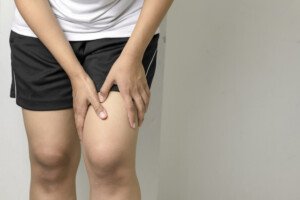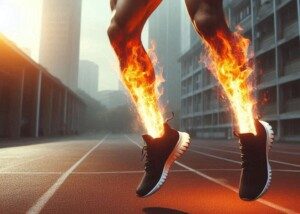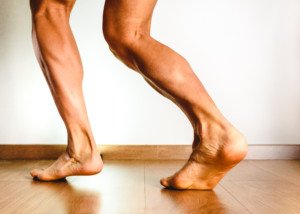
Have you ever been sitting out during sports play and then tried to stand and couldn’t due to “dead” legs?
This isn’t about your legs “falling asleep” due to a nerve being compressed from sitting in a scrunched position.
It’s about trying to get up, and your legs, particularly your quadriceps, just can’t support you, and you collapse back down.
I had a doctor weigh in on this, but before I tell you what he said, you should know that this exact situation once happened to me.
After training in volleyball with a volleyball club, I sat out because we were rotating in groups. I felt fine.
Then when it was time to stand, my legs just folded. My quadriceps felt very fatigued and weak, and I couldn’t get up.
Someone had to lift me off the floor and carry me to another part of the gym, where I just sat there to let this sudden leg weakness run its course.
Cause of Weak Legs, Inability to Stand, after Sports Play
“I would suspect that the culprit was lactic acid,” says Marc I. Leavey, MD, a primary care physician with 40-plus years of experience.
“During rigorous exercise, the muscles need energy faster than the normal metabolic pathways can provide it.
“An intermediate compound of metabolism, lactic acid, is produced as a means of delivering that energy without the use of oxygen.
“After a few minutes, it can build up, and the body responds to that buildup with burning or weakness in the muscles being exercised, such as the legs in volleyball.
“So a period of intense exercise may be followed by a buildup of lactic acid and an acute loss of strength and function.
“After a period of rest, which may be just 10 to 20 minutes, the lactate has been metabolized and all is back to normal.”
Note: I had not injured anything (no pulled hamstring or quadricep). This extreme weakness never occurred again, even though for years after, I continued to play at a very competitive level.
Leg work in volleyball is not the same as in basketball, tennis and soccer.
Though basketball involves a lot of jumping, keep in mind that in volleyball, along with the jumping is also a lot of deep hip flexion (squatting), from which the player must spring up from in different directions to pass balls.
Prevention
“You can help prevent this situation by staying adequately hydrated, being sure to practice good breathing techniques, and being aware of your body’s condition,” says Dr. Leavey.
“If you start feeling weakness or burning in a group of muscles or an extremity, don’t work through the burn; stop and rest.
“Weakness or discomfort that lasts more than a short time may be due to micro-tears in the muscles involved, and is a different type of process.

Dr. Leavey was formerly with Mercy Medical Center in Baltimore, MD, where his focus was primary care and internal medicine. He has a blog, STRING OF MEDICAL PEARLS.
 Lorra Garrick has been covering medical, fitness and cybersecurity topics for many years, having written thousands of articles for print magazines and websites, including as a ghostwriter. She’s also a former ACE-certified personal trainer.
Lorra Garrick has been covering medical, fitness and cybersecurity topics for many years, having written thousands of articles for print magazines and websites, including as a ghostwriter. She’s also a former ACE-certified personal trainer.
.


























